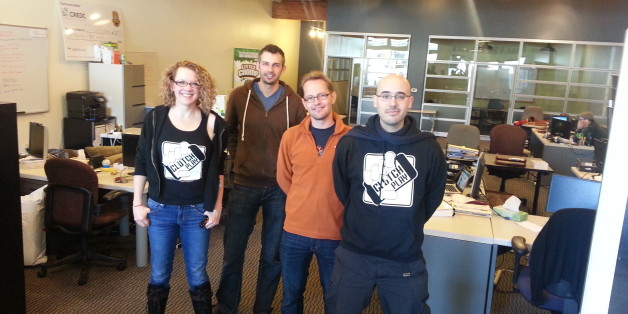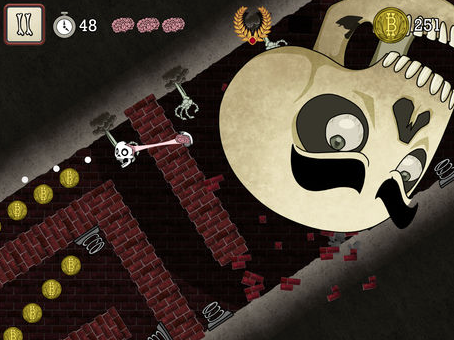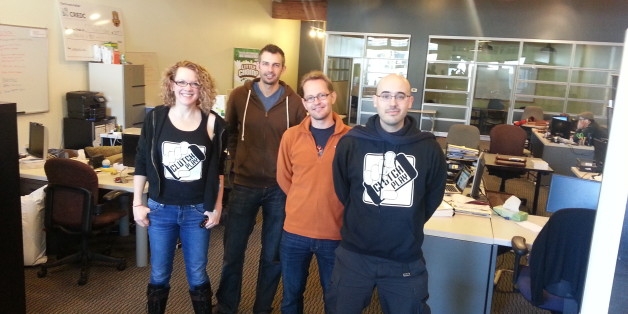Female gamers weigh in on Portland’s indie gaming culture, design trends and gender politics.
A common gamer image features a college-aged male in a man cave playing a first-person shooter designed by a Bay Area brogrammer.
But that was then. Today, gender exclusivity is out. Inclusivity is in.
“It used to be you were off playing your console in the basement,” says Amy Dallas, the founder of Portland-based startup ClutchPlay Games.
“It was very much a dude world. A lot of shooters and stuff. Now if you ride on any public transportation, everybody’s out playing their games. It’s really important that there’s a lot of different voices in games.”
But the industry still has a long way to go, Dallas says.
“If you ride on any public transportation, everybody’s out playing their games. It’s really important that there’s a lot of different voices in games.” —Amy Dallas, Founder, ClutchPlay Games
She recounted a story about a recent game development conference in Australia, where the first person in the room was a nine-year-old girl.
“I’m so glad to see you here,” Dallas told her. “The games industry needs you.” The girl’s eyes filled with tears.
In our January issue we profiled escape room designer Laura Hall. In the stories below, we profile two other female gamers, Dallas and Nina Freeman, who are pushing forward Portland’s small but thriving gaming community. They talk about democratizing the industry, building their businesses and gender politics.
Amy Dallas
 Dallas and the co-founders of ClutchPlay Games / ClutchPlay
Dallas and the co-founders of ClutchPlay Games / ClutchPlay
Dallas and the co-founders of ClutchPlay started out in 2007 working for a mobile game startup called Ngmoco. In 2016, Japanese mobile gaming company DeNa acquired Ngmoco for $400 million and moved the headquarters to San Francisco.
Dallas and her staff had grown attached to Portland, so they broke away and founded Clutchplay.
“It was rough when we started,” she says. “We made a lot of classic indie mistakes like focusing on the product first, not building a solid company.”
Their first major consulting gig was Backyard Monsters, a resource management game that inspired Clash of Clans. The San Francisco-based developer needed help migrating their game from Facebook to a mobile platform, and gave ClutchPlay twelve weeks to do it.
Dallas and her team finished a day early. The developer was stunned.
“It was rough when we started,” Dallas says. “We made a lot of classic indie mistakes like focusing on the product first, not building a solid company.”
With wins like that, Clutchplay built a reputation for high-end game development in record time. Their consulting portfolio grew to include mega-hits The Sims 2.0, Mass Effect and Tiger Woods PGA Tour ’02-’05.
Then, Clutchplay branched into developing its own products, mostly Angry Birds-style mobile games. Their first was Little Chomp.
“We worked on it for 10 months and made no money,” Dallas says, “but we licensed our game engine, so money came back in a roundabout way.”
“With tech or gaming you have to be at the right end of the curve,” Dallas says. “You might have the greatest game in the world but if it doesn’t hit the market at the right time or doesn’t capture peoples’ imagination, it won’t go anywhere.”
Clutchplay’s revenue has since grown to around $2 million a year.
The four-person team, along with seven or eight contractors, has pivoted back to consulting for a more reliable stream of income. They still develop the occasional original title, however, including their flagship bizarro game, Skullduggery! featuring a tax-collecting skull and players who rocket through the landscape collecting coins.
The game’s innovative swiping interface earned it a prestigious award at the PAX 10 gaming conference.
“Some successful companies will make millions a day, but they spend a million a day,” Dallas says. “It’s hard for small companies to compete in that market.”
Success doesn’t come easy for indie developers like ClutchPlay, which are matched against companies with much deeper pockets.
“Some successful companies will make millions a day, but they spend a million a day,” Dallas says. “It’s hard for small companies to compete in that market.”
And while free software makes game development more accessible, Dallas says, it also saturates the market.
“The more people are able to make games,” she says, “the more competition will increase, and discoverability will become harder.”
Riding the wave
Game development can feel like surfing: you have to catch the wave at just the right moment.
A consulting company, Clutchplay pivots toward cutting-edge trends. The current hype centers on augmented- and virtual-reality. After testing the Oculus Rift VR headset, Dallas and her colleagues began developing a VR version of Skullduggery, where players manipulate a life-sized skull.

Screenshot of Skullduggery!
“With tech or gaming you have to be at the right end of the curve,” Dallas says. “You might have the greatest game in the world, but if it doesn’t hit the market at the right time or doesn’t capture peoples’ imagination, it won’t go anywhere.”
Dallas says Portland still lacks sizeable game companies. Most people conflate tech and gaming, she says, but the industries follow different development tracks. Tech focuses more on building an overall brand, while the gaming industry is more product-oriented.
“It seems really strange because there’s a lot of talent, but there’s no corporate game jobs,” she says. “We’re trying to make something happen.”
Nina Freeman
 Nina Freeman / NashCo Photography
Nina Freeman / NashCo Photography
Portland-based developer Nina Freeman lies on the cutting edge of another trend — the use of games as a vehicle for narrative expression.
“I’m trying to depict real emotions. My characters are often weak because I want to depict real people,” she says. “There’s a place for caricature styles in games, but my purpose is to tell these honest stories and make sure there are lots of layers.”
In Cibele, players take on the role of Nina, a 19-year-old girl based on Freeman’s real-life experiences. They explore the landscape of a massive multiplayer game in the vein of World of Warcraft, but that’s just background noise.
The true purpose of the game unfolds in chats between Nina and a man she meets through the game. As the game escalates, the chatting gets more intimate and the two exchange photos.
“It’s semi-autobiographical,” Freeman says. “I met up with a dude through an online game when I was younger.”
Freeman developed the game for her master’s thesis and released it independently on Steam.
Another game, How I Did It, features a young girl who manipulates Barbie dolls to figure out sex. Lost Memories Dot Net, released this year, immerses players in a 14-year-old’s blog, straight out of the MySpace era.
In addition to releasing games through her own label, Star Maid Games, Freeman works full time job as a game designer at The Fulbright Company, an independent studio.
Free software tools have democratized game design, allowing players to develop their own games, she says.
“There are better tools for more people to make games. Who plays games and has access is very different from ten years ago.
Gender Politics
Dallas and Freeman have first hand experience with sexism in the male-dominated tech and gaming sectors. Dallas tackles it head-on, with the intensity of a rugby player.
“Women in games are tough,” she says, “I think the persona I give off says it wouldn’t be a good idea to mess with me.”
After experiencing a “textbook case of harassment” from a higher-up early in her career, Dallas, in her future leadership positions, drew a clear line in the sand.
Years later, a developer in her office made a sexist remark. Dallas pointed at him, and said, “Get in the conference room right now.”
In the conference room, Dallas told him, “if you ever talk to me or anyone else here like that again I’ll make sure it’s your last day. Do you understand me?” He burst into tears. “I didn’t mean anything by it,” he said.
“Everybody wants to talk about sexism in gaming,” Freeman says. “I just want to focus on promoting my work.”
“He was a lovely person,” Dallas says, reflecting on the experience. “You just have to understand you don’t talk to anybody like that. And he and I are still friends.”
Having to defend their role in the industry intensifies the workload for women in games. While a slew of media coverage has brought attention to their plight, it can also distract from the reason they entered the industry in the first place.
“Everybody wants to talk about sexism in gaming,” Freeman says. “I just want to focus on promoting my work.”




